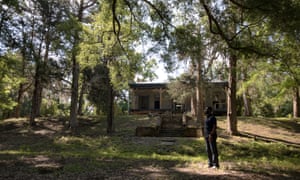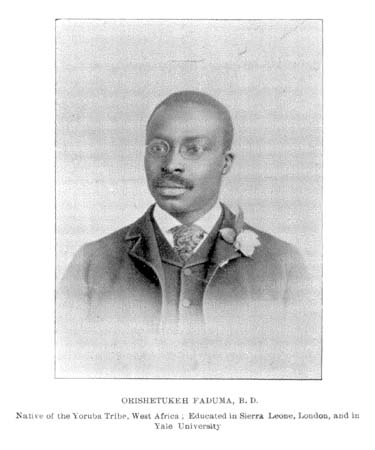Kaiser Railey, January 2001
It was a remarkable story that seemed to unravel into thin air. Several versions had been in circulation for generations -- for more than 150 years, in fact. But in each of them the screen went blank just as the plot started getting good.
That's precisely how writers find themselves in the throes of writing a book. Once I heard the story of Mississippi in Africa, I had to know how it ended. How could anyone hear that a group of slaves had emigrated from a Mississippi plantation, decades before the Civil War, to a place in Liberia called Mississippi in Africa, and not want to know what had become of them?
The plot was launched in the 1830s, when an antebellum Mississippi cotton planter and Revolutionary War veteran named Isaac Ross decreed in his will that after his daughter’s death his slaves should be freed and his plantation, called Prospect Hill, should be sold, with the proceeds used to pay the way for the freed slaves to a colony established for the purpose on the coast of West Africa, in what is now the nation of Liberia. A very weird story. I can't say, unequivocally, why Ross did what he did; you can decide for yourself by reading the book. But perhaps not surprisingly, some of his heirs were averse to the idea of selling the plantation, freeing the slaves, and paying their way “back to Africa,” in the vernacular of the times, though most of the slaves had been in America for many generations, and no doubt knew as much about the African continent as a person in Des Moines named O’Reilly knows about Ireland.
After a bitter, decade-long contest of Ross’s and his daughter’s wills by his grandson, Isaac Ross Wade, during which a slave uprising led to the burning of the Prospect Hill mansion, the death of a young girl, and the lynching of a group of slaves, approximately 300 of the slaves did immigrate to Liberia, beginning around 1845, to a parallel universe called Mississippi in Africa. A few of the slaves were not given the option to immigrate, for unknown reasons, and one family was freed outright and allowed to move to a free state in the U.S. What ultimately happened to the ones who were freed outright is still unknown; I hoped my book would spark some revelation about them, but so far, no go.
Because there were many conflicting versions of the story, I set out to find descendants of all the relevant groups in the U.S. and in Liberia. The immigrants from Prospect Hill were the largest group to settle in Liberia, a nation established by the American Colonization Society, which was comprised of abolitionists and slave holders who had different, yet strangely complementary reasons for wanting to export freed slaves. The book
Mississippi in Africa was the result of my research; this note was prompted by a reader’s email inquiring about the people I interviewed and got to know during the course of my research.
During that research, which began in the late 1990s, I interviewed Isaac Ross’s descendants in Mississippi, most of whom were proud of his legacy of having freed his slaves (and who, in a curious twist, turned out to be both black and white); I interviewed descendants of the heirs who had contested the will, who had a decidedly different take on the story, and descendants of the slaves who had chosen to remain in Mississippi, enslaved, and, finally, of descendants of the freed slaves who had immigrated to Mississippi in Africa.
In Liberia, which was at the time mired in a bloody civil war, I found that the immigrants had largely assumed the role formerly assigned to their masters, occupying the top tier of Liberian society, and that while some had been benevolent toward those less fortunate than them, others had oppressed and even enslaved members of the indigenous population. That disparity contributed directly to the nation’s two civil wars, from 1989 to 1996 and from 1999 to 2003, illustrating that Dixie isn’t the only place where old times are not forgotten.
The Prospect Hill story became more remarkable the deeper I probed, and along the way I met a remarkable cast of characters who shed light not only on its outcome but on the complex racial dynamics and cultural legacy of Ross’s actions. As readers of the book may recall, among those characters were three young men, the Railey brothers, native Liberians whose ancestors had come from Mississippi, who were, in 2001, when I arrived, trapped in a war zone. The Railey brothers made sure I was safe while I was in Liberia, and we remained in touch for many years. I still occasionally correspond with one of them, Augustus.







 I don't like to quote books cause that joint takes too much time. I previously said that I can name families who were Americo-Liberian or Salone creole that traveled back and forth between Africa, West Indies and the United states but by our grandparents generations contact started to die out. similar to the Blydens.
I don't like to quote books cause that joint takes too much time. I previously said that I can name families who were Americo-Liberian or Salone creole that traveled back and forth between Africa, West Indies and the United states but by our grandparents generations contact started to die out. similar to the Blydens.

 No you got to stop c00ning and eating Wendy's it aint good for you.
No you got to stop c00ning and eating Wendy's it aint good for you.

 Ex. If I'm Americo Liberian my ancestor was from South Carolina
Ex. If I'm Americo Liberian my ancestor was from South Carolina